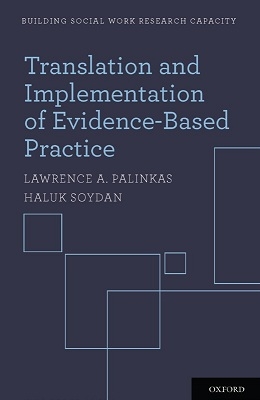New Book Promotes Social Work as a Driver in Translational Research Agenda
April 11, 2012 / by Eric Lindberg- Research
A new book authored by USC School of Social Work professors Lawrence Palinkas and Haluk Soydan seeks to outline the creation and evaluation of high-quality evidence on social work interventions.
Published by Oxford University Press, Translation and Implementation of Evidence-Based Practice is designed as a tutorial for social work researchers and scholars to understand the science of translating evidence into practice.
“It has become part of the general practicing public’s understanding that there are different levels of research quality,” said Soydan, who directs the school’s Hamovitch Center for Science in the Human Services. "The book uses engaging case studies to trace the process of compiling high-quality primary evidence, synthesizing that evidence through meta-analyses and clearinghouses such as the Cochrane and Campbell Collaborations, and implementing proven interventions to benefit vulnerable populations throughout the world.”
Soydan said implementation research has a long tradition in agriculture and other sciences, but has become increasingly popular in social work in recent decades, particularly following the creation of the Cochrane Collaboration in the early 1990s.
“That completely changed the paradigm of really understanding what scientific bias is, and it also changed the research landscape,” he said.
Although clearinghouses such as the California Evidence-Based Clearinghouse for Child Welfare, led by research professor John Landsverk, have improved the dispersal of proven interventions, the book warns against being complacent in ensuring that research is translated into practice.
Recent studies have suggested that the gap between the creation of new, effective interventions and their use in the field is as large as 20 years.
“We have to make sure the end users understand and implement these practices,” Soydan said.
In addition, he noted that much of the evidence created by clearinghouses and meta-analysis is generalized and may not be applicable to particular settings. Each client, neighborhood, community and culture will have its own needs, and practices should be adapted and retested to ensure effectiveness.
Research approaches discussed at length in the book include community-based participatory research, which seeks to foster inclusiveness and a sense of ownership among those involved in a given study, and mixed-method research, which combines qualitative and quantitative approaches.
The book’s authors emphasize the importance of translational research and innovation to the social work profession.
“No academic discipline can survive without innovation, and innovation is the foundation of social work practice,” they write. “Translational research and research translation both require collaboration, communication and compromise between researchers and practitioners; neither can occur without the participation of both communities.”
Translation and Implementation of Evidence-Based Practice is part of Oxford University Press’ Building Social Work Research Capacity Series.
To reference the work of our faculty online, we ask that you directly quote their work where possible and attribute it to "FACULTY NAME, a professor in the USC Suzanne Dworak-Peck School of Social Work” (LINK: https://dworakpeck.usc.edu)
